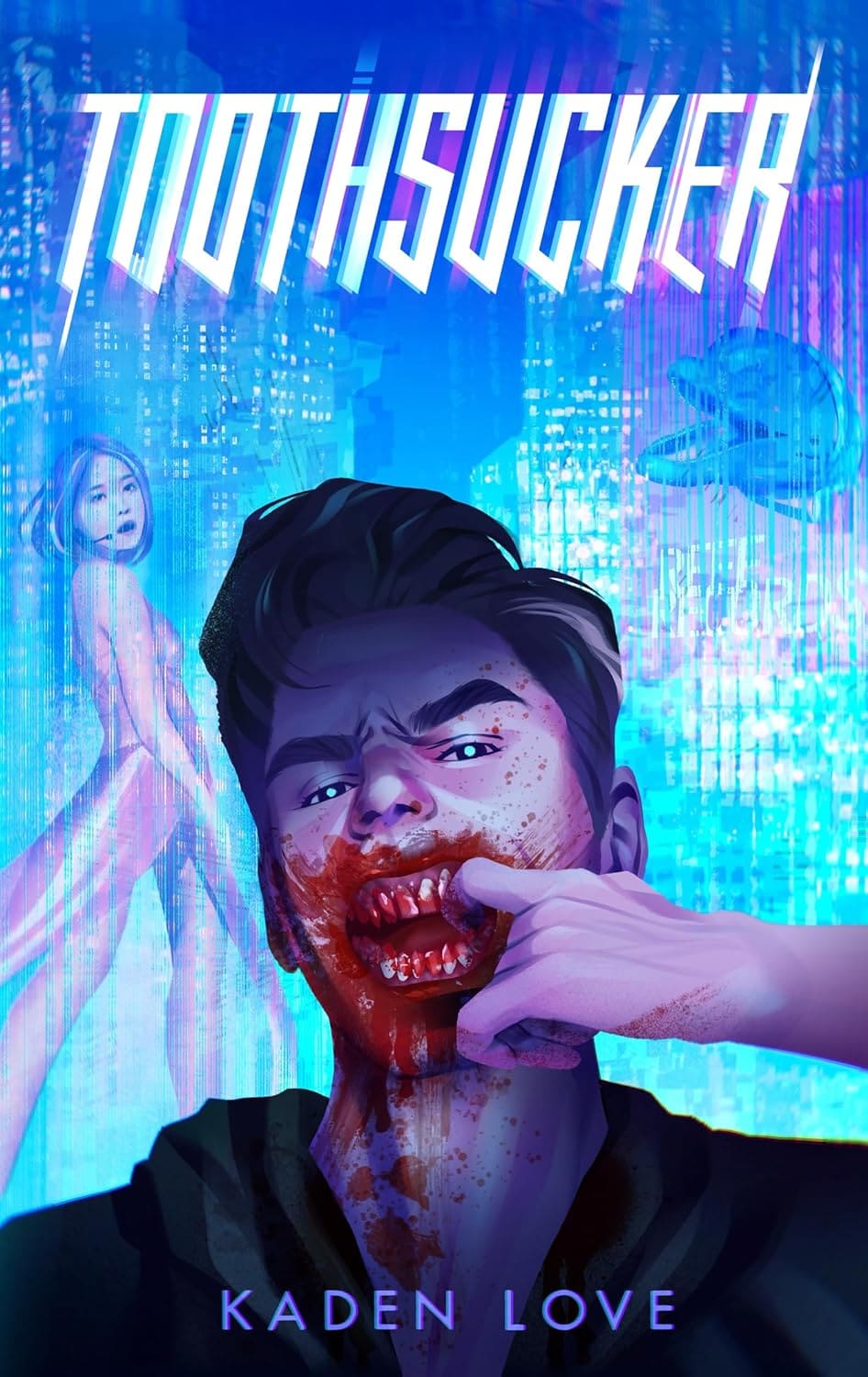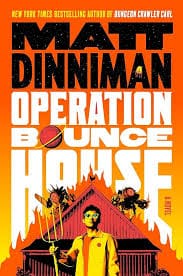
Something to chew over
Synopsis
In a cyberpunk future, an alarming disease strikes, dissolving the bones of those with cybernetic enhancements. Petya, a refugee, sells himself to a company experimenting with a potential cure and instead finds himself with a strange new implant… and a vampiric hunger for teeth.
Petya only wanted a short trial with easy money, and now he’s at the mercy of a company hell-bent on market control, even if it means turning him into their personal pharmaceutical assassin.
They’re out for political power, and Petya is out for an escape and teeth.
Review
Kaden Love is no stranger to eye-catching SFF ideas; his debut epic fantasy series Paladins of the Harvest, now two books in, features an intriguing organ transplant magic system. But his latest, Toothsucker, a fast-paced cyberpunk tale set in a future dystopia, takes to this to the next level, more full of wild concepts than Elon Musk’s ketamine diary. But in a pleasing sign of Kaden’s evolution as a writer, all these ideas simply serve to amaze rather than confuse and blend into a convincing cyberpunk hellscape, and among all the utterly wild neon-soaked brainstorming he still finds time to create a strong character-driven story with some very topical themes.
The story takes place in the Republic of Capital, the name of which suggests Love’s first cool idea: that political parties have been replaced by corporate entities who vie for the presidency from different sectors: entertainment, pharma, tech, etc. This is a society transformed by the discovery of the physical form of light (cool idea number two) and its districts go from one end of the spectrum (red, orange, yellow, the dangerous areas) to the middle (blue, green) and to the violent and indigo sectors, where the rich and influential live. Our protagonists are a bunch of young, lost souls who’ve been given a new hope under the tutelage of a suspicious scientist/power-broker aiming to attain power for (maybe?) good in this dystopia, and given a set of cool super powers to use on missions. The only downside? (cool idea number three coming at you): To sustain these new powers they must constantly snack on a diet of teeth, ripped right out of their victims’ mouths. Vampires, but for calcium rather than iron.
What’s so impressive about this cyberpunk tale is that these wild ideas are so effective, not falling into the trap of being chaotic but rather uniting to build a vivid world. The corporate-sector-as-government idea is cleverly done, framing the central plot around a tech virus that eats away at the bones and Big Pharma’s cure for it that various parties are scrabbling to get to first. It makes for a cool mission structure as well as we see the entertainment sector, complete with cybernetic dolphins (which are as wildly fun as they sound) and the SocStans, which are blue collar workers who became powerful once AI took all the white collar jobs, a very cool thought experiment. The ordering of the country by the spectrum of light is also endlessly fascinating; Love using the color schemes that so define the cyberpunk genre as integral world building. This is a well-thought out idea, complete with one of the most disturbing and horrific red light districts you’ll ever see.
Then of course there’s the tooth-eating. Love doesn’t skimp on this; so many scenes are frankly taken from the horror genre as unwitting victims have their jaws ripped off as our characters greedily snack on the molars (the best teeth, of course). The writing here is vivid and wickedly gruesome—there are some scenes you’ll take to your dreams I fear. And there’s so many more ideas as well, my favorites including edible tabs that provoke feelings such as nostalgia and social media adoration (would save a lot of time, sign me up).
But Love also supports this creative feast with some excellent characterization of the central protagonist, Petya, an immigrant with a complex past who’s desperate to do good even as he’s been forced to follow a mysterious stranger’s agenda and the horrific tooth-eating requirements that come with it. Some readers may struggle to empathize with him I suspect given that the victims of his violent addiction are frequently innocent, but I actually quite enjoyed the wild discordance between his self-conscious narrative and the utter moral depravity of his acts. This is the nature of addiction after all; and Love makes his self-loathing clear, a loathing that only abates when he meets Naoma, a singer beloved of the elites who appears contemptuous at first but has more going on. Their burgeoning relationship adds a compelling character arc to the second half.
Love also uses Petya’s narrative to explore meaty themes of immigration and the treatment of immigrants, which is a welcome through-line here; as well as the examination of corporate influence which is so central to a good cyberpunk story and spins out into a thrilling, twisty conspiracy thriller by the end.
Overall, I was so impressed by Love’s evolution here; this is a strong calling card for an exciting talent and a must-read for cyberpunk fans or just fans of wildly original worldbuilding. Tooth-eating vampires, a corporatist society run along the spectrum of light, and augmented dolphins; it should be mad, but it’s cyberpunk gold. Love’s neon tooth fairy hasn’t let us down.









Leave a Reply